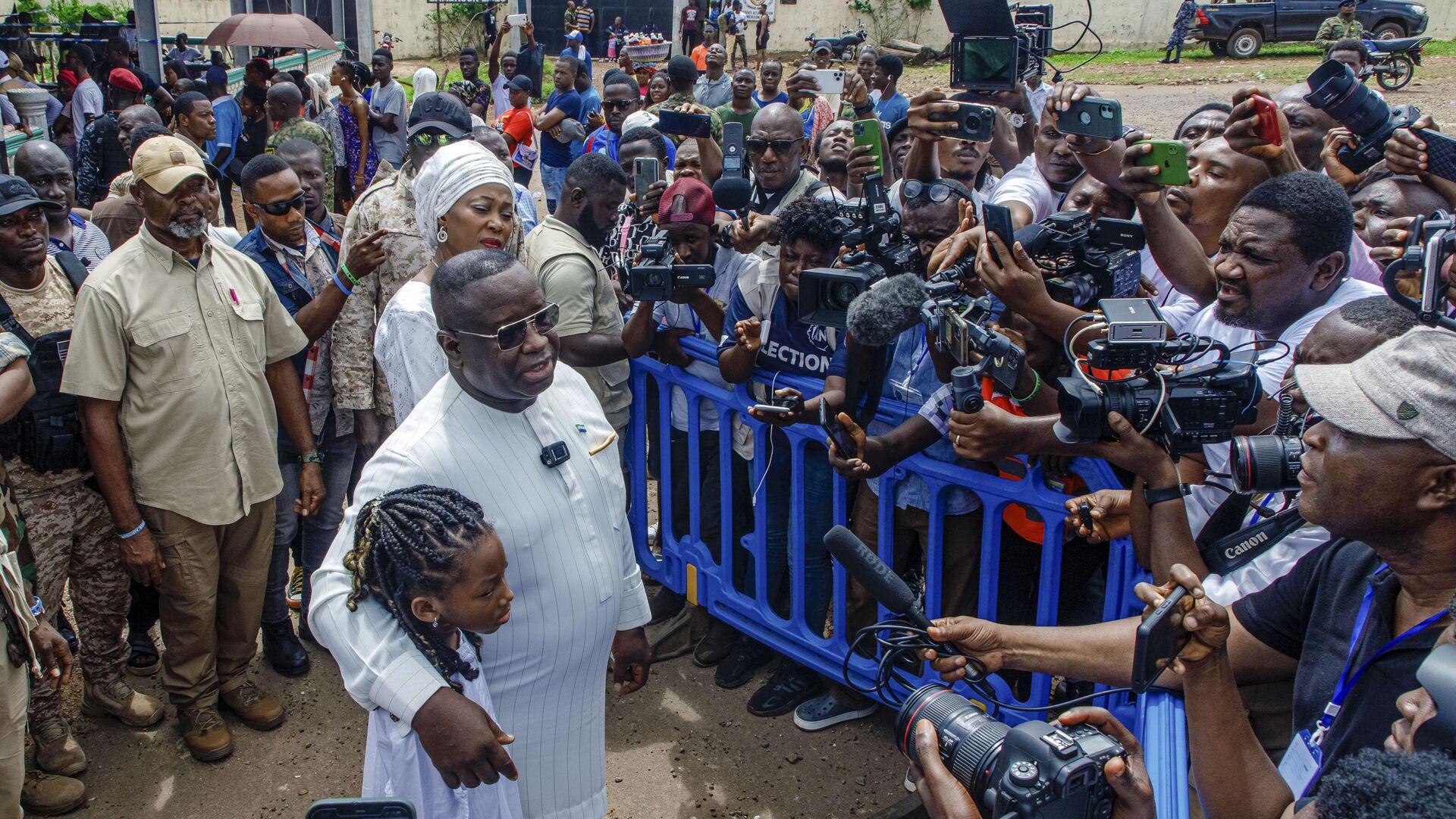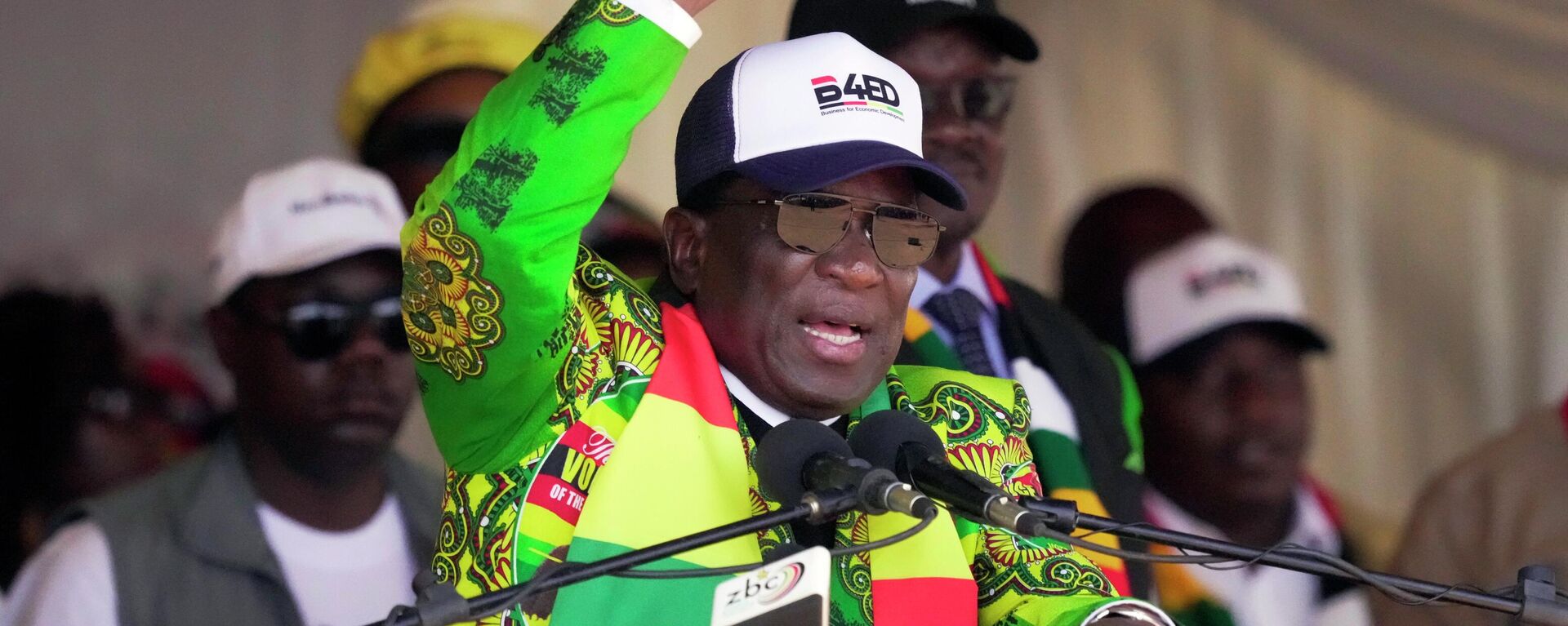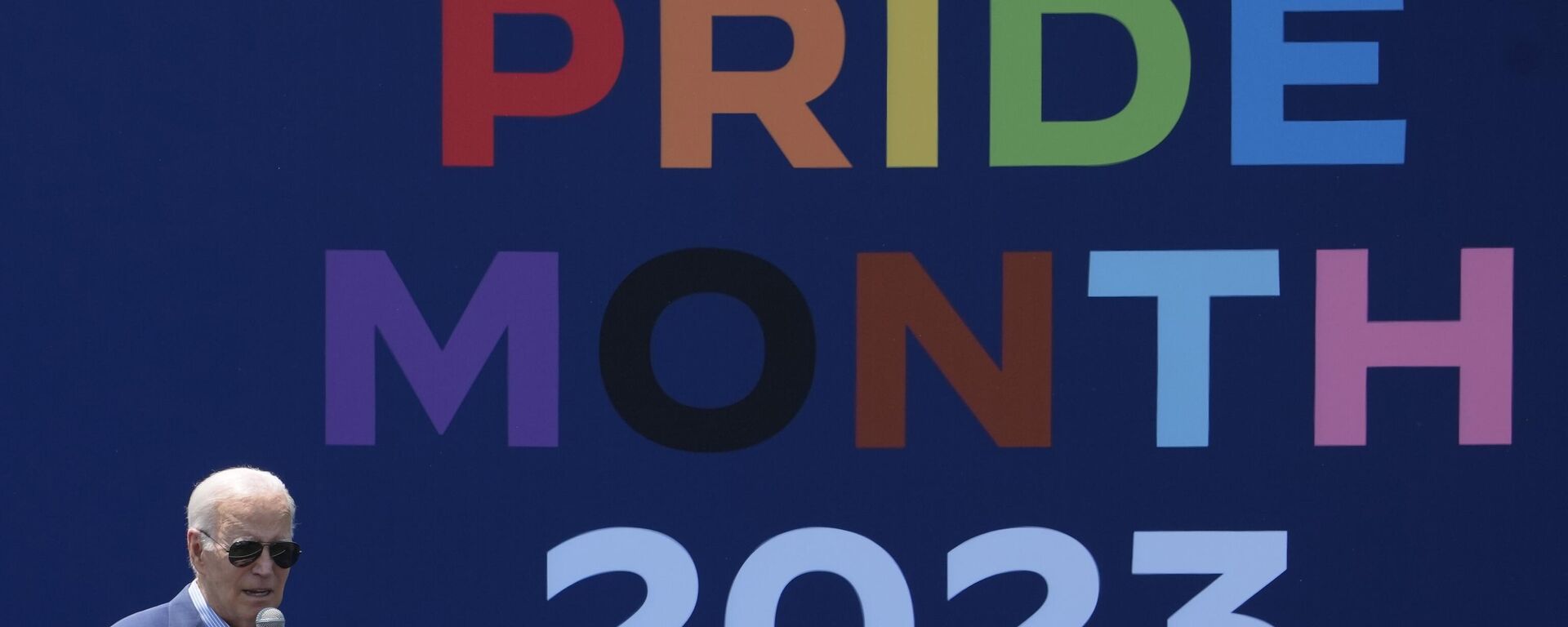https://en.sputniknews.africa/20230901/us-slaps-restrictions-on-sierra-leone-officials-over-rigged-elections-despite-au-assessment-1061778571.html
US Slaps Restrictions on Sierra Leone Officials Over 'Rigged' Elections Despite AU Assessment
US Slaps Restrictions on Sierra Leone Officials Over 'Rigged' Elections Despite AU Assessment
Sputnik Africa
On 27 June, Sierra Leone's electoral commission announced that President Julius Maada Bio had been re-elected to a second term in office with 56.17% of the... 01.09.2023, Sputnik Africa
2023-09-01T14:02+0200
2023-09-01T14:02+0200
2023-09-01T14:02+0200
sub-saharan africa
united states (us)
antony blinken
sierra leone
west africa
african union (au)
elections
presidential election
election meddling
us sanctions
https://cdn1.img.sputniknews.africa/img/07e7/09/01/1061780714_0:44:3166:1825_1920x0_80_0_0_87b6921fde4cdf93f53729f1d59943e2.jpg
The United States has announced visa restrictions on Sierra Leonean officials it accuses of "undermining democracy" in the West African nation. The decision comes after the June 2023 general election, which the US and other Western countries are claiming was not transparent or credible.According to US Secretary of State Antony Blinken, the visa ban will target those who allegedly manipulated or rigged the electoral process, intimidated voters, election observers or civil society groups, or violated human rights in Sierra Leone.He did not name the individuals affected by the policy, but said it will also apply to their family members. He added that the policy is not directed at the Sierra Leonean people, but at those who "threaten" their democracy.The US move contradicts the assessment of some local and regional observers, such as the African Union (AU) and the Economic Community of West African States (ECOWAS), who declared that the election was free and fair.The June election was won by President Julius Maada Bio of the Sierra Leone People's Party (SLPP), who secured 56.17% of the vote in the first round. His party also gained a majority in parliament. The main opposition All People's Congress (APC), led by Samura Kamara, who got 41.16% of the vote, rejected the result and demanded a re-run.The APC accused Bio and his party of rigging the election and using violence and intimidation to suppress dissent. It also boycotted parliament and other governance structures, and refused to seek legal recourse, alleging that the courts were biased.Instead, Kamara's party appealed to Western countries to sanction Bio and his allies for allegedly stealing the election.The US is one of the few Western countries that have responded to the APC's call. The US had previously urged the Sierra Leonean government to conduct an independent inquiry into the electoral process and correct any legal flaws that may have led to the dispute. However, after the government appointed an investigation committee, US officials described it as lacking credibility and independence.President Bio has dismissed any external criticism of his election victory, saying that no foreign entity has the right to judge his country's democratic process.The US visa ban is part of a broader pattern of US sanctions on African countries that it perceives as violating its standards of democracy and human rights. The US at present has sanctions on nine African countries, including Burundi, Congo, Mali, Libya, Zimbabwe, Somalia, South Sudan and the Central African Republic. These sanctions range from asset freezes and travel bans to trade restrictions and financial penalties.In June, the US imposed visa restrictions on Ugandan officials after the country adopted an anti-LGBTQ law. This came after US President Joe Biden condemned the law as "a tragic violation" of human rights that "jeopardizes the prospects of critical economic growth for the entire country".Uganda's Minister of Information, Chris Baryomunsi, said Biden's statements were blackmail, noting that the legislation was introduced in Uganda because - for its people - homosexuality is against their values and culture.
https://en.sputniknews.africa/20230815/zimbabwean-president-emphasizes-mutual-respect-in-nation-to-nation-ties-1061349191.html
https://en.sputniknews.africa/20230618/undermining-democracy-us-sanctions-uganda-officials-over-anti-lgbtq-law-1060002778.html
united states (us)
sierra leone
west africa
Sputnik Africa
feedback@sputniknews.com
+74956456601
MIA „Rossiya Segodnya“
2023
Muhammad Nooh Osman
https://cdn1.img.sputniknews.africa/img/07e7/04/0a/1058467512_0:0:1280:1280_100x100_80_0_0_ec723833bcbfcaed2e21952965ad99e4.jpg
Muhammad Nooh Osman
https://cdn1.img.sputniknews.africa/img/07e7/04/0a/1058467512_0:0:1280:1280_100x100_80_0_0_ec723833bcbfcaed2e21952965ad99e4.jpg
News
en_EN
Sputnik Africa
feedback@sputniknews.com
+74956456601
MIA „Rossiya Segodnya“
Sputnik Africa
feedback@sputniknews.com
+74956456601
MIA „Rossiya Segodnya“
Muhammad Nooh Osman
https://cdn1.img.sputniknews.africa/img/07e7/04/0a/1058467512_0:0:1280:1280_100x100_80_0_0_ec723833bcbfcaed2e21952965ad99e4.jpg
united states (us), antony blinken, sierra leone, west africa, african union (au), elections, presidential election, election meddling, us sanctions, sanctions
united states (us), antony blinken, sierra leone, west africa, african union (au), elections, presidential election, election meddling, us sanctions, sanctions
US Slaps Restrictions on Sierra Leone Officials Over 'Rigged' Elections Despite AU Assessment
Muhammad Nooh Osman
Writer/Editor
On 27 June, Sierra Leone's electoral commission announced that President Julius Maada Bio had been re-elected to a second term in office with 56.17% of the vote. His main rival, Samura Kamara, came in second with 41.16% of the vote.
The United States has announced visa restrictions on Sierra Leonean officials it accuses of "undermining democracy" in the West African nation. The decision comes after the
June 2023 general election, which the US and other Western countries are claiming was not transparent or credible.
According to US Secretary of State Antony Blinken, the visa ban will target those who allegedly manipulated or rigged the electoral process, intimidated voters, election observers or civil society groups, or violated human rights in Sierra Leone.
"Under this policy, the United States will pursue visa restrictions for those believed to be responsible for, or complicit in, undermining democracy in Sierra Leone," Blinken said in a statement on Thursday.
He did not name the individuals affected by the policy, but said it will also apply to their family members. He added that the policy is not directed at the Sierra Leonean people, but at those who "threaten" their democracy.
"This decision reflects the commitment of the United States to support Sierra Leoneans' aspirations to have free and fair elections that demonstrate the will of the people and strengthen democracy and the rule of law," Blinken added.
The US move contradicts the assessment of some local and regional observers, such as the African Union (AU) and the Economic Community of West African States (ECOWAS), who declared that the election was free and fair.
The June election was
won by President Julius Maada Bio of the Sierra Leone People's Party (SLPP), who secured 56.17% of the vote in the first round. His party also gained a majority in parliament. The main opposition All People's Congress (APC), led by Samura Kamara, who got 41.16% of the vote, rejected the result and demanded a re-run.
The APC accused Bio and his party of rigging the election and using violence and intimidation to suppress dissent. It also boycotted parliament and other governance structures, and refused to seek legal recourse, alleging that the courts were biased.
Instead, Kamara's party appealed to Western countries to
sanction Bio and his allies for allegedly stealing the election.
The US is one of the few Western countries that have responded to the APC's call. The US had previously urged the Sierra Leonean government to conduct an independent inquiry into the electoral process and correct any legal flaws that may have led to the dispute. However, after the government appointed an investigation committee, US officials described it as lacking credibility and independence.
President Bio has dismissed any external criticism of his election victory, saying that no foreign entity has the right to judge his country's democratic process.
The US visa ban is part of a broader pattern of
US sanctions on African countries that it perceives as violating its standards of democracy and human rights. The
US at present has sanctions on nine African countries, including Burundi, Congo, Mali, Libya, Zimbabwe, Somalia, South Sudan and the Central African Republic. These sanctions range from asset freezes and travel bans to trade restrictions and financial penalties.
In June, the US imposed visa restrictions on Ugandan officials after the country adopted an anti-LGBTQ law. This came after US President Joe Biden
condemned the law as "a tragic violation" of human rights that
"jeopardizes the prospects of critical economic growth for the entire country".Uganda's Minister of Information, Chris Baryomunsi, said Biden's statements were blackmail, noting that the legislation was introduced in Uganda because - for its people - homosexuality is against their values and culture.




